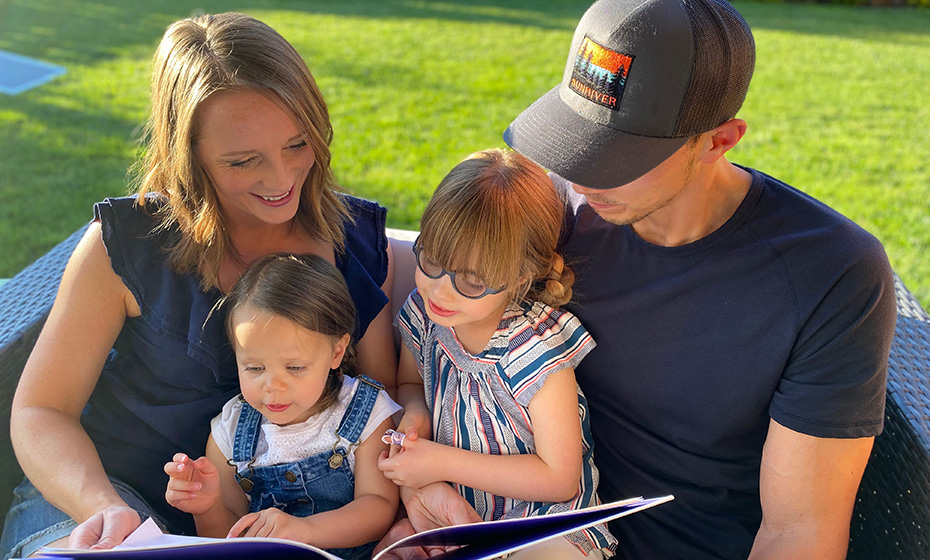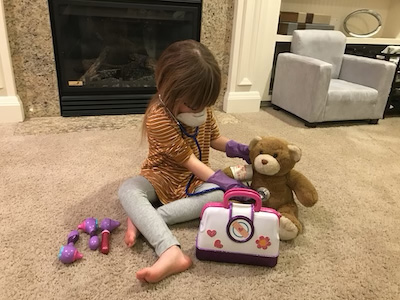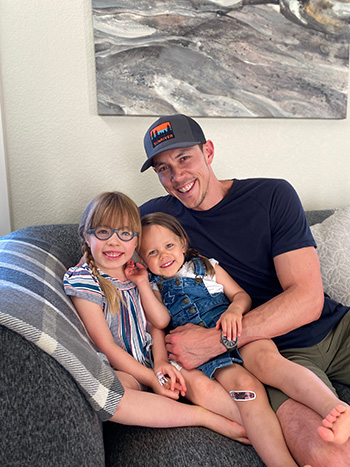Growing Up Happy with Prader Willi Syndrome
Sienna Balumas and her family find their greatest strength in the most vulnerable places

Sienna Rose Balumas likes to sing and dance. She also loves to pretend. She’s almost 6 and has just finished kindergarten.
“Her big thing now is being a teacher. She loves to tell all of us to get in line,” says her dad, Mike Balumas. “We find her up in her room with her books, doing lesson plans for her stuffed animals. It’s pretty adorable.”
Playing a teacher is a new game for Sienna, but playing a doctor is an old favorite. “She has about four doctor kits,” says her mom, Chelsea Balumas. “Every time we go to the doctor, she wears the gloves and asks them if she can pretend.”
And Sienna goes to the doctor a lot.
She has Prader Willi syndrome, a rare genetic disorder that affects physical, intellectual and behavioral development. It involves parts of the brain that produce hormones and regulate functions such as growth and appetite.
It’s a complex disorder with a wide range of symptoms that require treatment from many specialists over time.

A traumatic entry into the world
The first inkling that something was wrong came when Chelsea was 34 weeks pregnant. At a routine prenatal checkup, Sienna’s heart rate was unusually steady. Tests were inconclusive, but Chelsea was switched to OHSU’s perinatal team. They manage high-risk pregnancies. At an appointment at 37 weeks, Chelsea recalls, “they put her (Sienna) on the monitor, saw something wasn’t right and within 30 minutes I was on the table,” having an emergency C-section.
Sienna came out not breathing and was resuscitated. That first night in the Neonatal Intensive Care Unit, doctors had to resuscitate her several more times. She was also noticeably floppy and lacking in muscle tone.
“It’s not every day you have a baby and leave them in someone else’s hands,” Chelsea says. I think the hardest part was going home without her. I wouldn’t have been able to do it if we didn’t trust the people who were taking care of her with everything in us. That’s what got us through.”
Over the next 11 days, the NICU team ran a battery of tests. “They gave us all the information that they could,” says Mike, during a scary and confusing time. The NICU, filled with sick and premature babies and worried families, was a stressful place for Chelsea.
Mike, though, remembers the nurses who offered him comfort and taught him how to take care of newborn Sienna. As an only child, he’d had no experience with babies. He learned how to wrap her up like a baby burrito, and how to change a diaper and a feeding tube.
“This is a high-level NICU with many complex cases,” says Nikki Wiggins, NICU clinical nurse manager," and humanizing that environment, making parents part of the care team, showing them how to hold their babies skin to skin, that meaningful touch that only parents can offer, is a cornerstone of what we do.”

A life-changing diagnosis
Just before Sienna was discharged, geneticists told Chelsea and Mike that they were waiting to hear back on a test for Prader Willi syndrome. “They told us not to go home and google it, because the information that’s out there is very bleak. I think we knew as soon as we started googling,” says Chelsea. “She had every sign.” The floppiness, the pale hair and skin, the narrow bridge of her nose, the difficulties with feeding and with breathing while asleep.
All these are hallmarks of babies with Prader Willi. Older children with the disorder start to crave food constantly and cannot regulate their eating. This can lead to dangerous weight gain and sometimes behavioral issues. Children tend to be much shorter than average. Their sex organs are underdeveloped and they are usually infertile. Mild to moderate learning disabilities are common.
Chelsea’s longtime doctor — “she’s like family to me” — became Sienna’s doctor, too. At Sienna’s one-month checkup,'' she told us the results of the genetics test had come in. She looked at us and I knew. I fell to the ground. The hardest part of that day was we had to grieve a vision of what we thought her life would be like.”
Care, support and encouragement from a team of specialists
There is no cure for Prader Willi syndrome, but human growth hormone is the standard therapy. It increases height, muscle mass and stamina, and evidence suggests that it may improve cognitive ability and behavior. Sienna began treatment at 3 months. “I really think they gave her the best chance at life by diagnosing her so early,” Chelsea says. These days, Sienna attends special-ed classes for academic parts of the school day and joins the general classes for social time.
Sienna gets a shot of growth hormone every night and visits her endocrinologist (a doctor who treats growth and hormone problems) every six months for monitoring. When the dose increases, she checks in with the team at the sleep clinic because growth hormone can increase risk for apnea — interrupted breathing during sleep.
Soon after birth, she started to see physical therapists and occupational therapists. Speech therapy started a little later. She also sees a neurodevelopment team, which monitors her intellectual and physical development.
Sienna looks forward to going to Doernbecher. “She loves the doctors, the physical therapists, the pharmacist. She loves the valet!” Chelsea says.
An OHSU orthopedist, Scott Yang, was treating Sienna’s scoliosis — her spine curves sideways. Sienna spent 15 months wearing a series of plaster body casts to improve her spinal curve. “I think we developed a special relationship during those castings,” Yang says.
He says Sienna, who needed many X-rays, was the first patient to use Doernbecher’s low-dose X-ray machine, which reduces radiation exposure.
Yang collaborated with specialists across Doernbecher to make sure Sienna’s cast would not affect her lung development or cause sleep apnea. She spent her first night in a cast at Doernbecher under the close watch of a pulmonologist. For Sienna, and other patients with complex needs, Yang says, “this kind of 100% collaborative care, where specialists have easy access to each other’s expertise is very important.”
Sienna recently transitioned from the cast to a removable brace. As she grows, she will likely need surgery to straighten her spine. Her care team at Doernbecher will be able to support this and other medical needs as she gets older.

Hard-won happiness and laughter
Like many parents of kids with Prader Willi syndrome, Mike and Chelsea restrict access to food. Every social occasion requires vigilance: Bringing healthier cupcakes to birthday parties; making sure no food is on the ground. Mike hopes that Sienna’s sweet nature and the family’s emphasis on healthy eating and exercise will carry her through adolescence without too much turbulence. “Right now,” Mike says, “we’re kind of in a honeymoon period.”
Thinking back to the day they learned Sienna had Prader Willi syndrome, Chelsea sighs. “If only someone could have given us a snapshot on that day of what she would be like now. She’s so loving and hilarious and determined. She makes friends with everybody in a room.”
“She’s a great big sister,” her dad adds.
“She’s so happy,” says her mom, “and she makes us so happy.”
Sienna's parents are working hard to raise awareness and research funds for Prader-Willi Syndrome. Every year, they help organize a walk to raise funds for the Foundation for Prader-Willi Research. Learn how you can help.